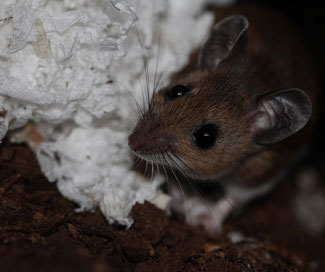Why Are There Mice in My Attic?
By Chris Williams on June 20, 2014.

Mice can often find good insulation for their nests in your attic.
If you have mice and they seem to be restricted to your attic, you’re lucky (or maybe unobservant). The mice would probably much rather be in your home, or at least in the wall voids, especially during the times when the attic is just too hot or too cold to be comfortable. Usually once mice are in the attic, they can find their way down into wall or ceiling voids and can emerge into your kitchen or other areas.
There are some reasons why mice might actually prefer your attic. It’s dark, rarely disturbed, and there are probably lots of boxes to nest in, and insulation to use for nest material. There may also be food in your attic in the form of insects. Many pests that overwinter in homes such as cluster flies, stink bugs, and lady beetles end up in attics, sometimes in large numbers. Silverfish are year-round residents in attics.
How Do Mice Get into Attics?
Let me count the ways. Any place there’s a dime-sized opening, a mouse can use it to get into a new space. Smaller openings can be gnawed until they are big enough to admit a mouse. Mice can climb outside walls or follow vines or tree branches onto the roof where it’s easy to find openings into the attic along the roofline or through vents.
Mice can easily get into a garage around most garage door openings, or even during times when the door is left open. Once inside, there may be openings around conduits or pipes or attic ladders that lead into the attic space.
So What’s the Problem? They’re Not in the House
- Mice carry parasites like ticks and mites. If mice are killed or a nest is abandoned, the parasites can move into living areas looking for a host.
- Mice have an odor. In areas where mice have been nesting for some time, the urine smell can be quite strong. And at some point, you will likely have to deal with the odor of dead mice (see below).
- Accumulations of mouse droppings and urine can contain disease particles which can become airborne and can be inhaled when a nesting site is cleaned or disturbed.
- Mice have been known to gnaw on electrical and other utility lines in an attic. At best, you might have an expensive repair. At worst, you could have an attic fire.
- Unwelcome noises: scratching, gnawing, scurrying, squeaking.
For years, a friend of mine periodically had a problem with an odor that seemed to be dead mice in wall voids in her kitchen. She had seen droppings from mice in her garage on occasion but had never seen evidence of mice in her kitchen or anywhere else inside her house. An inspection of the attic found chewed-open packets of mouse bait inside a box. She had forgotten that she had old mouse bait stored there. Periodically mice would find the bait, feed on it, and probably return to their nests in the wall voids to die.
Mice in Your Attic? Call Colonial. We can inspect, track, and remove the mice. More importantly, we have the skill and materials to mouse-proof not only your attic, but the rest of your home to keep mice out.
Photo credit: alsteele / Foter / (CC BY-SA 2.0)